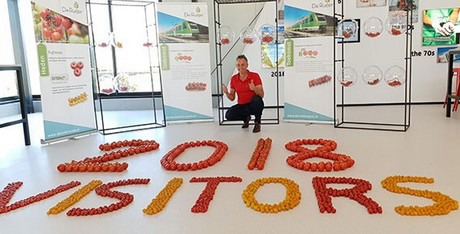A tomato variety that is selling well one year might not be on the market the year after. That is why De Ruiter breeds new varieties every year. The company does not do this by themselves though but instead works closely with growers, traders, and consumers.
In the De Ruiter Experience Center in the Dutch town of Bleiswijk, the entire supply chain gets to gain knowledge about innovative technologies and sustainable varieties. Around 300 varieties are being cultivated in the hypermodern greenhouse. In the De Ruiter Market, visitors can see, taste, feel and judge 70 tomato varieties.
The De Ruiter Experience Center facilitates meetings between growers, traders, and consumers. This creates a discussion as well as new collaborations. In 2018, over 4,000 visitors came to the Experience Center. John van der Knaap, Manager of De Ruiter Experience Center, proudly says: “An Italian grower and an Austrian supermarket chain have met in the Experience Center and together they decided to grow and sell a new variety. It is so cool that they struck this deal at our place.”
 John in October 2018 when the 2018th visitor was being welcomed.
John in October 2018 when the 2018th visitor was being welcomed.
Laser show and dinner
"We regularly organize events in the Experience Center,” says Van der Knaap. “For instance, we organized a dinner in collaboration with Maggi for 160 consumers. They could try out tomato dishes that were prepared with less salt. The collaboration concluded in Maggi raising the amount of vegetables they used in the recipe. We also launch new varieties on a regular basis. We recently launched a variety that grows well under artificial lighting. The so-called Radiance tomato. These tomatoes were presented by us in a very special way, with a laser show. We invited a select group of growers and traders to witness this event that took place at five in the morning.”
Close collaboration with supply chain partners
Around 70% of all visitors in the De Ruiter Experience Center are growers. “We work together closely with growers because, when push comes to shove, they decide which varieties to cultivate. We hand out the seeds to the growers in order to get feedback from them. We also work together more with wholesalers and supermarkets since their influence is growing larger and larger. Together with Wageningen University & Research, we set up consumer panels. This way we can test independent varieties on shelf life and taste”, says Van der Knaap.
Artificial light and efficient water usage
"In the De Ruiter Garden (demo greenhouse) we use a variety of innovative technologies,” Van der Knaap explains. “For instance, half of the greenhouse is lighted with artificial lighting, which includes led-lighting. Especially in the months of September to April, the tomatoes grow faster under artificial lighting. To prevent wasting water, the water used for every plant is measured with special sensors. The difference in the water that is needed per plant can, after all, differ 30% depending on the tomato variety. This technology, which is called APH (Advanced Precision Horticulture), is so far only used by 25 growers.”
5 to 10 new varieties each year
De Ruiter has a yearly revenue of 800 million dollars, of which 150 million dollars go directly to the R&D department. Out of the 125-150 varieties that are bred yearly, only 5-10 varieties, which will eventually be sold, remain after the testing and selection process. Sometimes it can take up to 8 years for a new variety to get to market. In total, around 100-150 varieties are actively sold. With 300 varieties, the De Ruiter Garden is the largest testing location. Besides that, the company collaborates with 1200 growers who test the varieties in their nurseries.
Diversification, local production, sustainability
Van der Knaap sees global growth of tomato cultivation. “The amount of hectares per company is increasing, but there is also more attention given to diversification, local production, and sustainability. The big growers are now also cultivating smaller varieties. More and more countries now have hypermodern greenhouses available and are producing for their own country. The focus is on cultivating sustainable varieties, like Strabena, a vine tomato that doesn’t have to be packed in plastic due to its strong vine”, says Van der Knaap.
Scale benefits after takeovers
The takeover by Monsanto (2008) and Bayer (2018) provided De Ruiter with significant scale benefits. For instance, easy access to new techniques, like DNA analysis. “It is now much easier to conduct large scale analysis, which leads to faster innovations for lower costs. After the takeover by Bayer there is also more focus on environmental friendly cultivation of the crops in terms of DNA and crop protection”, Van der Knaap says.
Source: Rotterdam Food Cluster
Author: Adiraan van der Giessen
